Google is like Iron Man’s JARVIS.
It is built to understand human behaviors and to fetch the most relevant information for us instantly—and nowadays, it’s the smartest it has ever been.
A lot of this is owed to the fact that Google is using its own AI and natural language processing (NLP) behind the scenes. The search engine has evolved far beyond ingesting and translating searches literally, and now can gauge the intent, sentiment, and expectations behind a search.
Here’s a rundown of how NLP and SEO play together today, and what you need to know in order to maintain top positions on SERPs.
A crash course on Google’s BERT algorithm
You’ve likely heard of BERT before—Google’s shorthand for “Bidirectional Encoder Representations from Transformers.” Aside from being a mouthful to pronounce, BERT was one of the largest algorithm updates to ever be announced. (Note: Google releases hundreds of updates throughout the year, but many of those go unannounced and/or largely undetected.)
When BERT was released in 2019, the company announced that it would affect the results and rankings for 10% of search queries. Fast forward to today and BERT now powers nearly every English-based query entered into Google.
“We see billions of searches every day, and 15 percent of those queries are ones we haven’t seen before–so we’ve built ways to return results for queries we can’t anticipate…we’re making a significant improvement to how we understand queries, representing the biggest leap forward in the past five years, and one of the biggest leaps forward in the history of Search. ” – Google’s announcement of BERT
So what does BERT do exactly?
In a nutshell, BERT helps Google read the words before and after any search term to understand its true context and meaning. It uses machine learning to evaluate the sentiment, category, and salience (importance of words to a subject matter) of terms and to ultimately understand language like humans do.
As you can imagine, BERT is a complicated algorithm. But the end result is what we’re used to seeing everyday: relevant search results on Google, even when we misspell words or aren’t sure how to phrase the question we want to ask.
Google’s BERT in action
Thanks to BERT, Google can now take a garble of words like “is it better to eat carrots or broccoli for eyes health” and read it as a question posed by someone looking to improve eye health.
Or, as explained by Google, if someone searches “brazil traveler to usa need a visa,” Google understands the significance of “to.” With BERT, it understands that the user is most certainly a Brazilian looking to visit the U.S.—not the other way around.
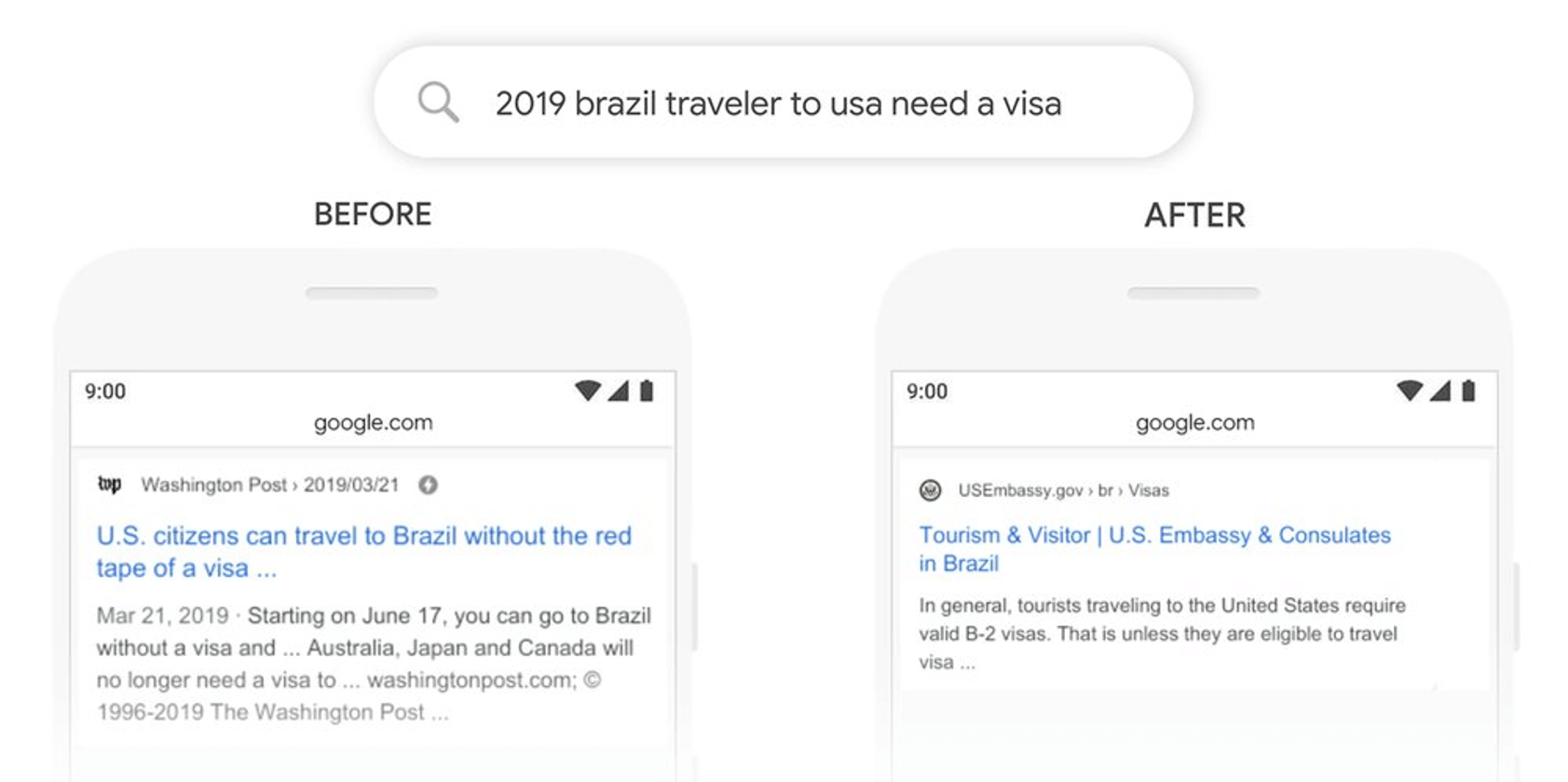
 BERT not only applies to organic rankings. It also applies to featured snippets that Google generates around a query. Case in point: Google gives the example of someone searching for “parking on a hill with no curb.” By its own admission, the search engine would previously put too much emphasis on “curb” and ignore the word “no” and thereby show a snippet showing the exact opposite of what the user was searching for.
BERT not only applies to organic rankings. It also applies to featured snippets that Google generates around a query. Case in point: Google gives the example of someone searching for “parking on a hill with no curb.” By its own admission, the search engine would previously put too much emphasis on “curb” and ignore the word “no” and thereby show a snippet showing the exact opposite of what the user was searching for.
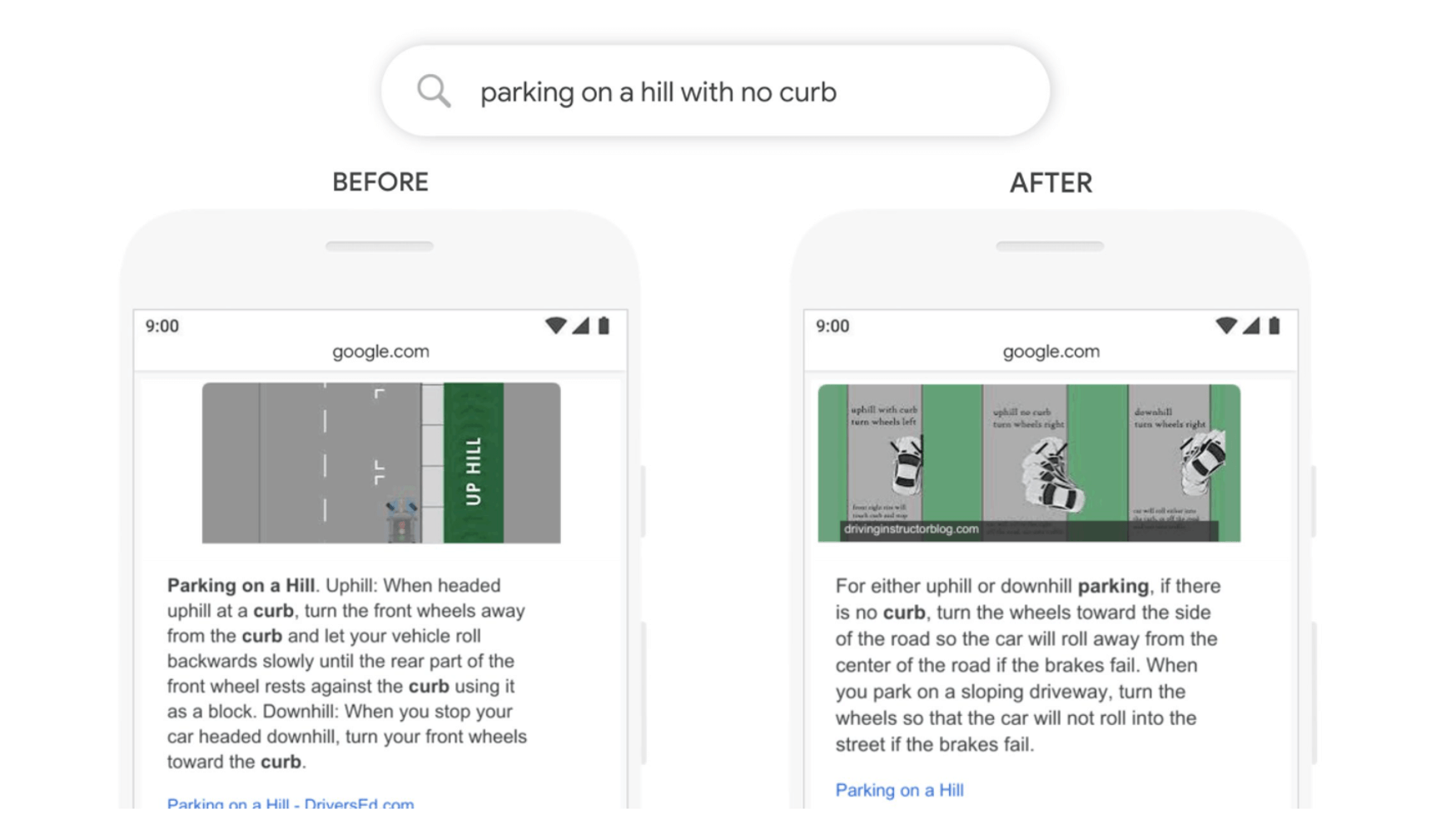
How does BERT and NLP affect your SEO strategy?
From the beginning, Google spokespeople have wanted to make it clear that there’s nothing to optimize in regards to BERT. BERT is simply here to make Google work better, and to match the right pages with the right searches.
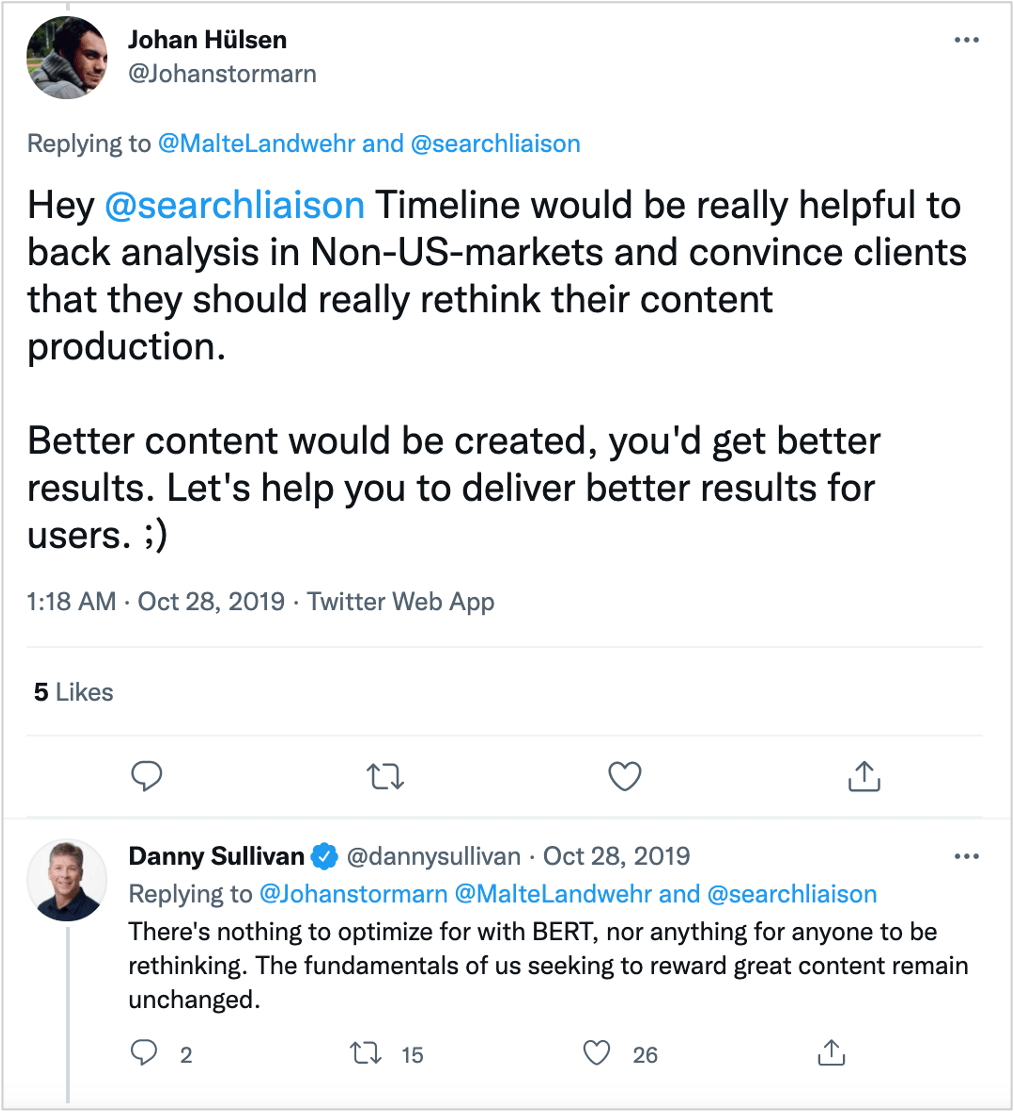
At the same time, BERT (and Google’s overall investment in NLP) signals a shift in how “quality content” is defined. If you weren’t in the habit of doing so already, you need to focus on writing for people, not for machines, in order to maximize your chances of your rankings.
Furthermore, NLP enables Google to better determine whether you’re an actual expert in your space. While in the past, you may have been able to rank on SERPs by mimicking the content of top-ranking blogs of a given query—today, this hack may not cut it.
You need to prove through various on-page and off-page SEO signals that you’re a trusted authority and that you can provide one-of-a-kind insights. Granted, not all queries are created equal. Some queries will demand much more technical content than others. That’s where some level of optimization comes in.
How to use ContentEdge to check your NLP score
There are various keyword tools available at your disposal that can help point you in the right direction. But unlike many of its counterparts, ContentEdge utilizes its own AI-powered tech to specifically score content relevance.
ContentEdge itself is one of the most affordable tools for keyword research, SEO optimization, and AI-generated content. Using ContentEdge, you can receive clear instructions for strengthening the readability, relevance, and natural language of your page so that you take steps to optimize each of these.
Here’s how.
1. Enter your keyword and link into Content Insights
Content Insights is a tool within ContentEdge that shows how your content stacks up against other top-ranking content. Simply insert an existing URL for a blog, webpage, or other property into the “fetch URL” field. ContentEdge will then fetch the content from the page and display it inside its text editor.
On the left-hand side, you’ll see several different measurements regarding the content, including an overall grade (for content relevance), word count, readability level, and more. For comparison purposes, ContentEdge also shows you the average word count, readability level, and more of competitive results.
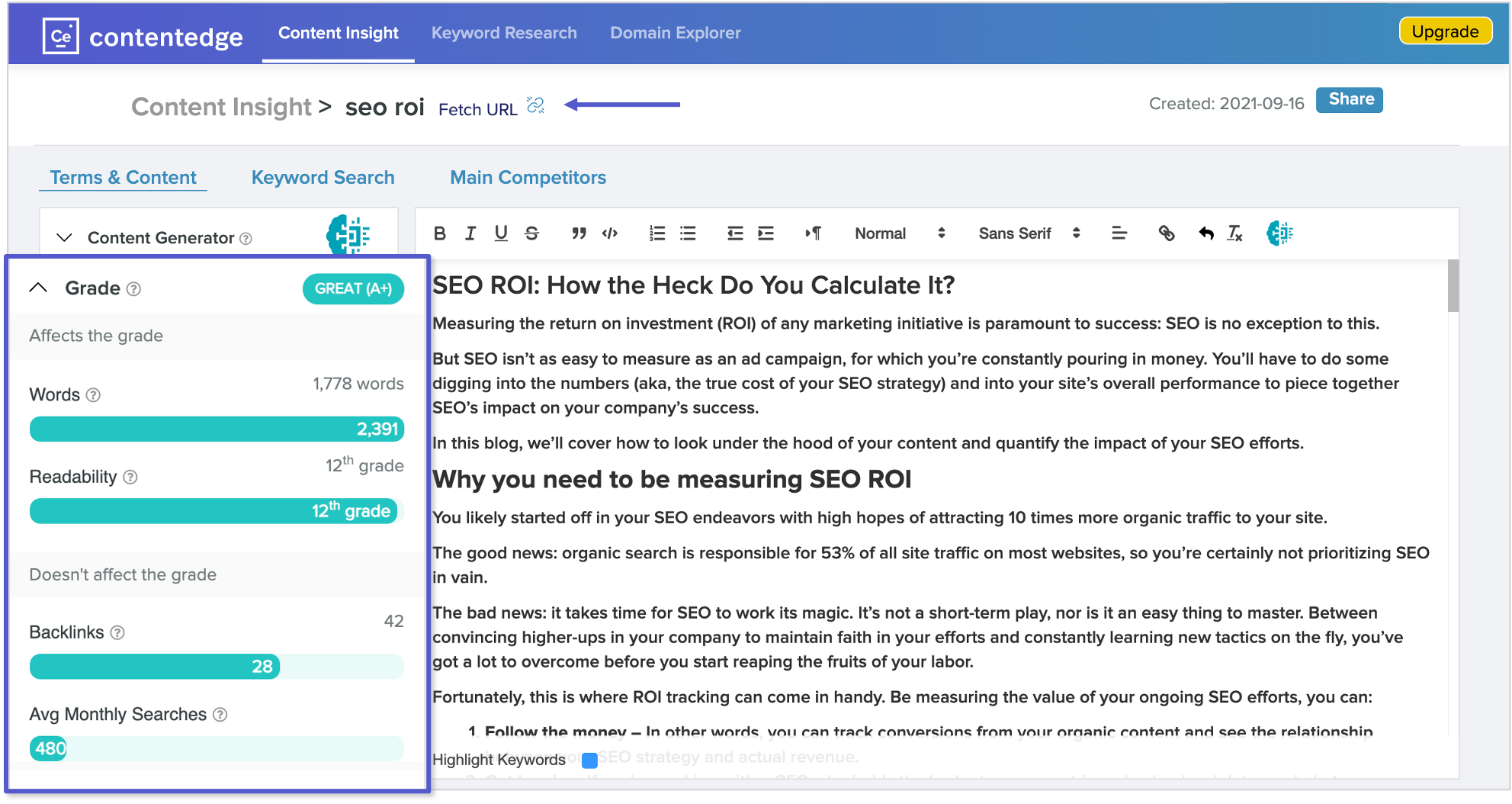

2. Analyze your opportunities
In addition to relevance scores, ContentEdge will produce a list of semantically related words and their typical usage. The idea is to anticipate the words that Google deems important. And while you shouldn’t obsess over the number of times you include a certain word in your content, you should use this list to verify two things: (A) that the keyword you chose does, in fact, attract the audience that you thought it would. And (B) that you’re writing in the same language as your target reader.
As mentioned earlier, some topics will warrant more technical verbiage than others. This list provides a good benchmark for how most people think and write about the subject at hand.
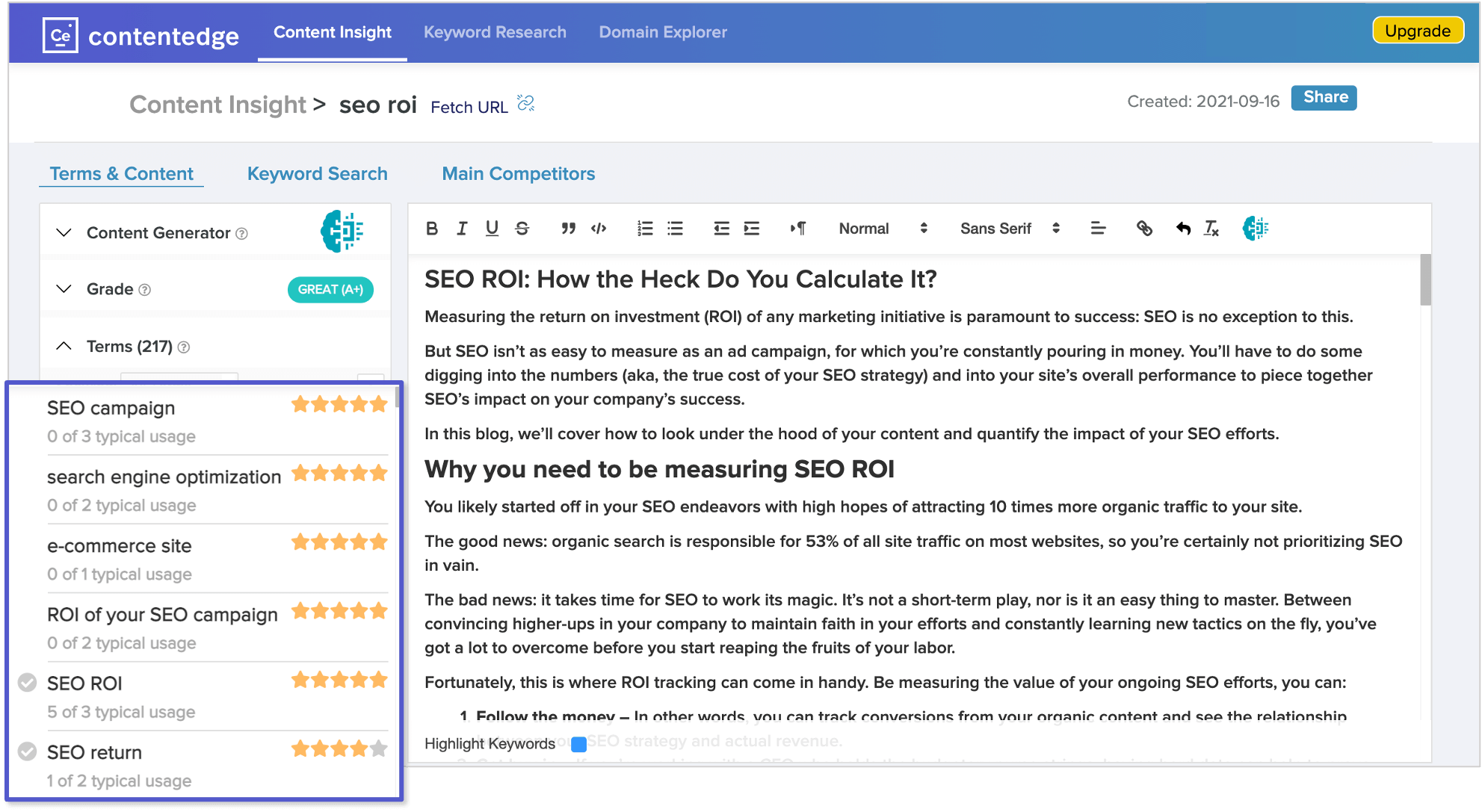
3. Make live changes
Tweak your content directly within ContentEdge. ContentEdge will automatically save your progress, so that if you need to step away for a sec, you don’t have to worry about losing your work.
As you make edits, ContentEdge will also update the left-side metrics and scores, giving you a real-time evaluation of the organic competitiveness of your page.
4. (Optional) use the AI Content Generator
If you’ve fallen into a creative rut and aren’t sure how to expand upon your existing content, you can always use ContentEdge’s Content Generator, which serves as an AI copywriter.
Click the brain icon within the Content Insights tool to get started. You’ll be prompted to provide a title, as well as a short description of what type of content you’re looking for. Content Generator will then spin up a 100% unique body of text based on your inputs—it’ll generate one paragraph at a time, which you can paste into the text editor or refresh for a new option.
NLP and SEO for the win
SEO and NLP go hand in hand. You can’t expect to win first-page positions without taking NLP into consideration. Fortunately, if you’re writing from experience, then you’ll enjoy the easiest time passing Google’s various tests for content quality and relevance.
For additional help, you can tap a tool like ContentEdge to understand how your content fares among other popular results. Try the platform out for free today.
